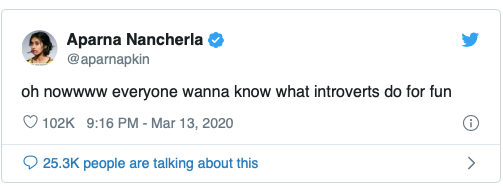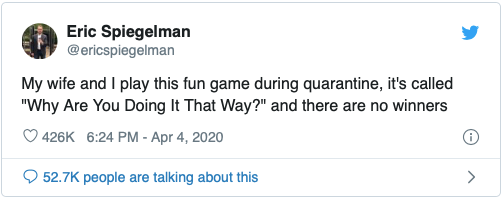Coronavirus Joke: 2020 is a unique leap year. It has 29 days in February, 300 days in March and 10 years in April.
Why is it that we so often lean into humour during dark and challenging moments? And what might be the benefit of actively looking for moments of lightness and laughter as we negotiate our way through the uncharted waters of the COVID-19 crisis?
Safety in silliness
It was notable in the early days of the coronavirus outbreak – when it was still a menacing but apparently distant threat – that much of the discussion about it amongst my peer group was through the lens of humour. Dark jokes about Hollywood disaster movies, silly memes with bottles of Corona beer in protective face masks.
Then, it started to show up it our own countries, maybe even in the cities where we lived. We started to see signs around us that this might just be something really serious. What was one of the most common responses as the infection numbers started to tick up and people began to strip the supermarket shelves in a wave of panic-shopping? To make jokes about toilet roll!
Inappropriate humour?
Even if you’ve never heard the phrase before, most of us are familiar from first-hand experience with the phenomenon of ‘paradoxical laughter’ – laughter that shows up at unusual or even inappropriate moments. Some neuroscientists observe that a part of the brain known to be important to laughter – the limbic system – is also the home of the amygdala, which mediates the fight-flight response to danger. Could it be that when something scary shows up that we cannot fight or flee from, we turn to humour as an alternative means of discharging stress?
Research by the Mayo Clinic would seem to substantiate this. They reported that laugher cools down the stress response – reducing levels of adrenalin and cortisol, slowing down heart rate, and decreasing blood pressure. It also increases the intake of oxygen-rich air and stimulates the release of endorphins in the brain.
This could explain why people in high-stress professions so often refer to laughter and humour as essential coping mechanisms. I’ve worked in prisons and psychiatric hospitals – places that many imagine to be grim and serious – and experienced them both as being full of laughter.
Laughter brings people together
And this laughter was always communal – groups of people laughing together in the face of stressful situations. Research from the University of Chapel Hill, North Carolina shows that shared laughter increases how similar people feel towards one another, how much people like one another, and how much we want to associate with each other.
So it stands to reason that as we face a crisis that has thrust some of us into close quarters with one another, while tearing some of us apart, we should seek out any means of improving the relationships with those physically close to us, while trying to remain close with those who we cannot be with.
When we laugh we connect. When we laugh we discharge stress. And here’s the thing – both of these things could actually mean that laughter – if not literally the best medicine – is good for our health.
Laughter can fight disease
The Mayo Clinic’s research also indicates that one of the long-term effects of laughter is an improved immune system – positive thoughts and interactions release neuropeptides that help fight serious illnesses. Not only that, it improves long-term mood as well – it stimulates release of serotonin, which is often depleted in people who suffer from mood disorders such as depression.
All of this just affirms what the flow of jokes over the past few months suggests we already know – that laughter is essential to life, especially in difficult times.
Laughter really does seem to be the best medicine for a lot of us right now. But why?
So with that in mind, here are some of our favourite tweets, memes, and bits of COVID-era humour from the internet! And contact us with anything that’s brought a smile to your face over the past few weeks!
1. Be honest with yourself about what represents ‘essential’ food shopping for you…
2. Introverts, this is your time to shine

3. At least the pandemic has raised the average level of basic hygiene …
 4. Enjoy quality time with your significant other during lockdown…
4. Enjoy quality time with your significant other during lockdown… 
5. You learn to make your own fun in quarantine.
Curious how laughter and emotional resilience shape great leadership?
Discover how our Equine Leadership Development Programme helps leaders build connection, awareness, and agility, even in times of crisis.
Explore the programme and lead with grounded presence (and maybe a little humour).
Related content

Together We Rise
2025 has been a year of profound transformation. And yet, amidst the complexity and...

Leading in Complexity: Webinar Insights on Building Truly Resilient Teams
Work is not getting simpler. It is getting faster and more demanding. Many leaders and...

Community is Strategy: Rising Above Competition in Women’s Leadership
For decades, we were taught that success looked like climbing to the top – faster,...
